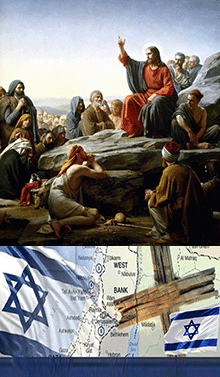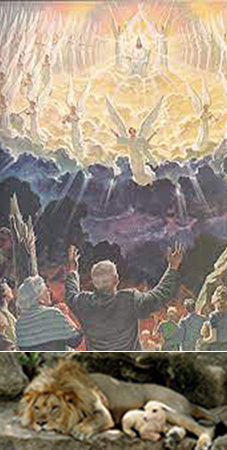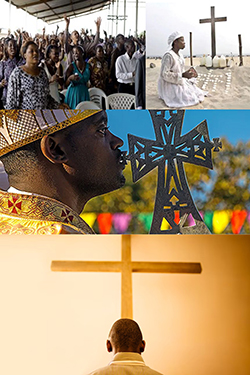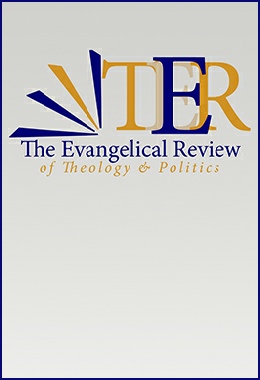THE EVANGELICAL REVIEW OF THEOLOGY & POLITICS
VOL. 12, 2024
ARTICLES
Article: 2024-01
 Matthew Wong,
Matthew Wong,
‘An Evaluative Review of the Major Theological and Exegetical Problems Inherent in Supersessionism.’
KEY WORDS
|| Supersessionism || Covenant Theology ||
|| Fulfilment || Covenants || Land of Israel ||
|| Hermeneutics ||
ABSTRACT
Despite renewed interest in the theological relationship between the Church and Israel in recent times, supersessionism remains the default and entrenched position within much of the contemporary Western Church. This article identifies and traces the historical roots of three strains of supersessionism before it presents and critically engages with key supersessionist beliefs. It is argued that one’s position on the Church-Israel relationship is not a matter of soteriological importance but nonetheless has significant hermeneutical and theological implications. Providing an evaluative review of supersessionism’s key dogmas, this paper concludes that inherent theological, hermeneutical, and exegetical weaknesses severely undermine the doctrine’s biblical credentials.
Painting: Carl Bloch (1834-1890), Sermon on the Mount (1877), in Museum of National History at Frederiksborg Castle, Frederiksborg Slot, 3400 Hillerød, Denmark
Uploaded/Published : January 1, 2024 | ERTP Vol 12, 2024, pages, A1-28
Article: 2024-2
Zach Doppelt
‘A Re-evaluation of Anglo-Irish Premillennialism 1789-1914:
Part 1.’
KEY WORDS
|| Historic Premillennialism || Dispensationalism ||
|| Nineteenth Century || Charles Spurgeon || Jewish Restoration ||
|| J. C. Ryle || Eschatology || Futurism || Historicism ||
ABSTRACT
 Contemporary premillennial interpretations of the last days and the kingdom of God have been largely dominated by two primary interpretations, often described by the nomenclature of “dispensational premillennialism” and “historic premillennialism.” The conclusion is that dispensationalism, though popular in the 19th and 20th centuries, has been replaced by historic premillennialism which is more akin to non-dispensational views of the 19th century and earlier (perhaps summarizing the views of the patristics as well), hence the formation of the term, “historic premillennialism.”
Contemporary premillennial interpretations of the last days and the kingdom of God have been largely dominated by two primary interpretations, often described by the nomenclature of “dispensational premillennialism” and “historic premillennialism.” The conclusion is that dispensationalism, though popular in the 19th and 20th centuries, has been replaced by historic premillennialism which is more akin to non-dispensational views of the 19th century and earlier (perhaps summarizing the views of the patristics as well), hence the formation of the term, “historic premillennialism.”
This article posits the case that this conclusion is reductionist. And, to simplify the premillennial viewpoints down to these two competing interpretations misses the overlapping theological concerns as well as the cultural and contextual milieus that contribute to developing theology. In order to demonstrate, this article will focus on what is commonly called the “long 19th century.” Specifically, this article will begin by comparing contemporary theological thought with writers of the previous century and will then proceed to assess key Anglo-premillennialists from the 19th century.
Uploaded/Published : January 25, 2024 | ERTP Vol 12, 2024, pages, A29-48
Article: 2024-3
Zach Doppelt
‘A Re-evaluation of Anglo-Irish Premillennialism 1789-1914:
Part 2’
KEY WORDS
|| Historic Premillennialism || Dispensationalism ||
|| Nineteenth Century || Charles Spurgeon || John Nelson Darby ||
|| Plymouth Brethren || Eschatology || Futurism || Historicism ||
ABSTRACT
 Contemporary premillennial interpretations of the last days and the kingdom of God have been largely dominated by two primary interpretations, often described by the nomenclature of “dispensational premillennialism” and “historic premillennialism.” The oft taught conclusion is that dispensationalism, though popular in the 19th and 20th centuries, has been replaced by historic premillennialism which is more akin to non-dispensational views of the 19th century and earlier, perhaps summarizing the views of the patristics as well (An evaluation of the patristics is outside of the scope of these articles, whereas I will focus primarily on the 19th century and beyond. Likely, one can find premillennial support for many views in the patristic writings though the evidence is scant enough to claim any contemporary perspective as identical to the early church writings.), hence the formation of the term, ”historic premillennialism.”
Contemporary premillennial interpretations of the last days and the kingdom of God have been largely dominated by two primary interpretations, often described by the nomenclature of “dispensational premillennialism” and “historic premillennialism.” The oft taught conclusion is that dispensationalism, though popular in the 19th and 20th centuries, has been replaced by historic premillennialism which is more akin to non-dispensational views of the 19th century and earlier, perhaps summarizing the views of the patristics as well (An evaluation of the patristics is outside of the scope of these articles, whereas I will focus primarily on the 19th century and beyond. Likely, one can find premillennial support for many views in the patristic writings though the evidence is scant enough to claim any contemporary perspective as identical to the early church writings.), hence the formation of the term, ”historic premillennialism.”
This second article of two posits the case that this conclusion is reductionist. And, to simplify the premillennial viewpoints to these two competing interpretations misses the overlapping theological concerns as well as the cultural and contextual milieus that contribute to developing theology. In order to demonstrate the aforementioned thesis, this article will focus on what is commonly called the “long 19th century” as a focus. Here, Irish premillennialist authors will be evaluated with a specific focus on the “Plymouth Brethren.” The resulting analysis will then be compared with British premillennial authors. Finally, the article will present some possible ways forward in theological discourse for premillennialism as a whole.
Uploaded/Published : January 25, 2024 | ERTP Vol 12, 2024, pages, A49-66
Article: 2024-4
Daniel Kirkpatrick
‘Seminaries Headed for a Cliff:
A Problem & Proposal for Christian Seminaries’
KEY WORDS
|| Seminaries || Population Cliff || Statistics || Christian Higher Education ||
|| Enrollment Decline || Demographics ||
ABSTRACT
 Termed the “population cliff” of 2025 by demographers, a reference to a sharp population decline in the number of college-eligible 18 year olds, institutions of higher education are considering how to navigate their future in light of a lower-than-normal recruitment base attributed to the decline in birth rates stemming from the Great Recession of 2008. Christian seminaries, many of which are already struggling in student enrollment and finances, are particularly vulnerable due to their lack of diversification in program offerings, their traditional modalities of delivery, and their small endowments. If seminaries are dependent primarily upon their graduate programs for enrollment, they will likely experience the effects of the population cliff around 2029 or 2030, some seven years away from the date of this article. This article seeks to raise awareness of the population cliff problem and suggest solutions to Christian seminaries in hopes that they may be carried over the looming population cliff and towards a flourishing new frontier..
Termed the “population cliff” of 2025 by demographers, a reference to a sharp population decline in the number of college-eligible 18 year olds, institutions of higher education are considering how to navigate their future in light of a lower-than-normal recruitment base attributed to the decline in birth rates stemming from the Great Recession of 2008. Christian seminaries, many of which are already struggling in student enrollment and finances, are particularly vulnerable due to their lack of diversification in program offerings, their traditional modalities of delivery, and their small endowments. If seminaries are dependent primarily upon their graduate programs for enrollment, they will likely experience the effects of the population cliff around 2029 or 2030, some seven years away from the date of this article. This article seeks to raise awareness of the population cliff problem and suggest solutions to Christian seminaries in hopes that they may be carried over the looming population cliff and towards a flourishing new frontier..
Uploaded/Published : January 25, 2024 | ERTP Vol 12, 2024, pages, A67-78
Article: 2024-5
Joshua J.W. Yen
‘Fyodor Dostoevsky
The Genesis of Genius’
KEY WORDS
|| Fyodor Dostoevsky || Literature || Christianity ||
|| Nihilism || Orthodoxy || 19th Century Philosopy ||
ABSTRACT
 Fyodor Michailovich Dostoevsky was a 19th century Russian author whose literary contributions have been some of the most influential in history. Despite being predominantly a writer of fiction, one cannot deny the influence that he had over the fields of philosophy, psychology, and theology. This article does not aim to provide an in-depth analysis of all of Dostoevsky’s ideas and their biographical roots. Rather, to provide the reader with the cultural and biographical influences for the cornerstones of his worldview, facilitating interpretation and reflection on his ideas. By discussing the genesis of his anthropological framework, his views on the nature of man, his fear of nihilism, and finally the solution which he found in Christ, readers would be able to better appreciate the works of Dostoevsky and understand, with more clarity, the reasons for why he held certain positions
Fyodor Michailovich Dostoevsky was a 19th century Russian author whose literary contributions have been some of the most influential in history. Despite being predominantly a writer of fiction, one cannot deny the influence that he had over the fields of philosophy, psychology, and theology. This article does not aim to provide an in-depth analysis of all of Dostoevsky’s ideas and their biographical roots. Rather, to provide the reader with the cultural and biographical influences for the cornerstones of his worldview, facilitating interpretation and reflection on his ideas. By discussing the genesis of his anthropological framework, his views on the nature of man, his fear of nihilism, and finally the solution which he found in Christ, readers would be able to better appreciate the works of Dostoevsky and understand, with more clarity, the reasons for why he held certain positions
Uploaded/Published : May 8, 2024 | ERTP Vol 12, 2024, pages, A79-90
Article: 2024-6
Thorsten Prill
‘Good News For Africa?
The Challenge of Other Gospels to the Church’s Mission
in Contemporary Sub-Saharan Africa’
KEY WORDS
|| African Christianity || Gospel of Legalism || Hyper-Grace Gospel ||
|| Poverty || Power Gospel || Prosperity Gospel ||
ABSTRACT
 The gospel of Jesus Christ is the message of the church’s mission. It is a message of love, grace, forgiveness and salvation. However, many messages that are taught at mission rallies, crusades and conferences or preached in churches across sub-Saharan Africa differ significantly from the gospel that the apostles of Jesus and the early church proclaimed. The most prominent of these other gospels is the prosperity gospel, but it is not the only one. There are other “other gospels” whose impact on the African church and its mission should not be underestimated. Among these messages are the power gospel, the hyper-grace gospel and the gospel of legalism. The power gospel lacks the Christ and cross-centredness of the apostolic gospel, and while the hyper-grace gospel twists the biblical concept of grace, the legalistic gospel is short of it. With its emphasis on the outward manifestations of the Holy Spirit, the power gospel has led to a redefinition of spirituality. The marks of Christian discipleship and leadership are no longer godly conduct and maturity but the exercise of power. The hyper-grace gospel has contributed to this paradigm shift by claiming that there is no need for ongoing repentance anymore. Sin has no place in hyper-grace preaching, whereas the gospel of legalism declares the disregard of certain rules and regulations as sinful, which are not sinful in a scriptural sense.
The gospel of Jesus Christ is the message of the church’s mission. It is a message of love, grace, forgiveness and salvation. However, many messages that are taught at mission rallies, crusades and conferences or preached in churches across sub-Saharan Africa differ significantly from the gospel that the apostles of Jesus and the early church proclaimed. The most prominent of these other gospels is the prosperity gospel, but it is not the only one. There are other “other gospels” whose impact on the African church and its mission should not be underestimated. Among these messages are the power gospel, the hyper-grace gospel and the gospel of legalism. The power gospel lacks the Christ and cross-centredness of the apostolic gospel, and while the hyper-grace gospel twists the biblical concept of grace, the legalistic gospel is short of it. With its emphasis on the outward manifestations of the Holy Spirit, the power gospel has led to a redefinition of spirituality. The marks of Christian discipleship and leadership are no longer godly conduct and maturity but the exercise of power. The hyper-grace gospel has contributed to this paradigm shift by claiming that there is no need for ongoing repentance anymore. Sin has no place in hyper-grace preaching, whereas the gospel of legalism declares the disregard of certain rules and regulations as sinful, which are not sinful in a scriptural sense.
There is both a need for a pastoral response that welcomes those affected by these other gospels and a need for biblical teaching that is contextual and helps Africans deal with the manifold challenges of life on their continent. However, the ultimate antidote to these other gospels is the Christ-centred, cross-centred and grace-centred gospel as we find it in the Scriptures.
Uploaded/Published : July 18, 2024 | ERTP Vol 12, 2024, pages, A91-105
Review: 2024-01
Christopher Watkin.
Biblical Critical Theory:
How the Bible’s Unfolding Storyline
Makes Sense of Modern Life and Culture
Grand Rapids, MI: Zondervan Academic, 2002.
hc, xxiii+648. $26.29, £25.00. ISBN 978-0-310-12872-4.
Reviewed by Walter Lamberti.
Uploaded/Published : January 28, 2024 | ERTP Vol 12, 2024.
pages, BR1-2.
Review: 2024-02
Tremper Longman III.
The Fear of the Lord is Wisdom:
A Theological Introduction to Wisdom in Israel
Baker Academic, Grand Rapids (2017).
pp. 336 £24.50 ISBN: 080102711X.
Reviewed by Daniel Martin.
Uploaded/Published : February 2, 2024 | ERTP Vol 12, 2024.
pages, BR3-6.
Review: 2024-03
Matthew Anslow.
Fulfilling the Law and the Prophets:
The Prophetic Vocation of Jesus in the Gospel of Matthew
Eugene, OR: Pickwick, 2022.
Pp. 394 £61.36 ISBN: 166672341X.
Reviewed by Rubin James Yi McClain.
Uploaded/Published : February 29, 2024 | ERTP Vol 12, 2024.
pages, BR7-10.










 Contemporary premillennial interpretations of the last days and the kingdom of God have been largely dominated by two primary interpretations, often described by the nomenclature of “dispensational premillennialism” and “historic premillennialism.” The conclusion is that dispensationalism, though popular in the 19th and 20th centuries, has been replaced by historic premillennialism which is more akin to non-dispensational views of the 19th century and earlier (perhaps summarizing the views of the patristics as well), hence the formation of the term, “historic premillennialism.”
Contemporary premillennial interpretations of the last days and the kingdom of God have been largely dominated by two primary interpretations, often described by the nomenclature of “dispensational premillennialism” and “historic premillennialism.” The conclusion is that dispensationalism, though popular in the 19th and 20th centuries, has been replaced by historic premillennialism which is more akin to non-dispensational views of the 19th century and earlier (perhaps summarizing the views of the patristics as well), hence the formation of the term, “historic premillennialism.” Contemporary premillennial interpretations of the last days and the kingdom of God have been largely dominated by two primary interpretations, often described by the nomenclature of “dispensational premillennialism” and “historic premillennialism.” The oft taught conclusion is that dispensationalism, though popular in the 19th and 20th centuries, has been replaced by historic premillennialism which is more akin to non-dispensational views of the 19th century and earlier, perhaps summarizing the views of the patristics as well (An evaluation of the patristics is outside of the scope of these articles, whereas I will focus primarily on the 19th century and beyond. Likely, one can find premillennial support for many views in the patristic writings though the evidence is scant enough to claim any contemporary perspective as identical to the early church writings.), hence the formation of the term, ”historic premillennialism.”
Contemporary premillennial interpretations of the last days and the kingdom of God have been largely dominated by two primary interpretations, often described by the nomenclature of “dispensational premillennialism” and “historic premillennialism.” The oft taught conclusion is that dispensationalism, though popular in the 19th and 20th centuries, has been replaced by historic premillennialism which is more akin to non-dispensational views of the 19th century and earlier, perhaps summarizing the views of the patristics as well (An evaluation of the patristics is outside of the scope of these articles, whereas I will focus primarily on the 19th century and beyond. Likely, one can find premillennial support for many views in the patristic writings though the evidence is scant enough to claim any contemporary perspective as identical to the early church writings.), hence the formation of the term, ”historic premillennialism.” Termed the “population cliff” of 2025 by demographers, a reference to a sharp population decline in the number of college-eligible 18 year olds, institutions of higher education are considering how to navigate their future in light of a lower-than-normal recruitment base attributed to the decline in birth rates stemming from the Great Recession of 2008. Christian seminaries, many of which are already struggling in student enrollment and finances, are particularly vulnerable due to their lack of diversification in program offerings, their traditional modalities of delivery, and their small endowments. If seminaries are dependent primarily upon their graduate programs for enrollment, they will likely experience the effects of the population cliff around 2029 or 2030, some seven years away from the date of this article. This article seeks to raise awareness of the population cliff problem and suggest solutions to Christian seminaries in hopes that they may be carried over the looming population cliff and towards a flourishing new frontier..
Termed the “population cliff” of 2025 by demographers, a reference to a sharp population decline in the number of college-eligible 18 year olds, institutions of higher education are considering how to navigate their future in light of a lower-than-normal recruitment base attributed to the decline in birth rates stemming from the Great Recession of 2008. Christian seminaries, many of which are already struggling in student enrollment and finances, are particularly vulnerable due to their lack of diversification in program offerings, their traditional modalities of delivery, and their small endowments. If seminaries are dependent primarily upon their graduate programs for enrollment, they will likely experience the effects of the population cliff around 2029 or 2030, some seven years away from the date of this article. This article seeks to raise awareness of the population cliff problem and suggest solutions to Christian seminaries in hopes that they may be carried over the looming population cliff and towards a flourishing new frontier.. Fyodor Michailovich Dostoevsky was a 19th century Russian author whose literary contributions have been some of the most influential in history. Despite being predominantly a writer of fiction, one cannot deny the influence that he had over the fields of philosophy, psychology, and theology. This article does not aim to provide an in-depth analysis of all of Dostoevsky’s ideas and their biographical roots. Rather, to provide the reader with the cultural and biographical influences for the cornerstones of his worldview, facilitating interpretation and reflection on his ideas. By discussing the genesis of his anthropological framework, his views on the nature of man, his fear of nihilism, and finally the solution which he found in Christ, readers would be able to better appreciate the works of Dostoevsky and understand, with more clarity, the reasons for why he held certain positions
Fyodor Michailovich Dostoevsky was a 19th century Russian author whose literary contributions have been some of the most influential in history. Despite being predominantly a writer of fiction, one cannot deny the influence that he had over the fields of philosophy, psychology, and theology. This article does not aim to provide an in-depth analysis of all of Dostoevsky’s ideas and their biographical roots. Rather, to provide the reader with the cultural and biographical influences for the cornerstones of his worldview, facilitating interpretation and reflection on his ideas. By discussing the genesis of his anthropological framework, his views on the nature of man, his fear of nihilism, and finally the solution which he found in Christ, readers would be able to better appreciate the works of Dostoevsky and understand, with more clarity, the reasons for why he held certain positions